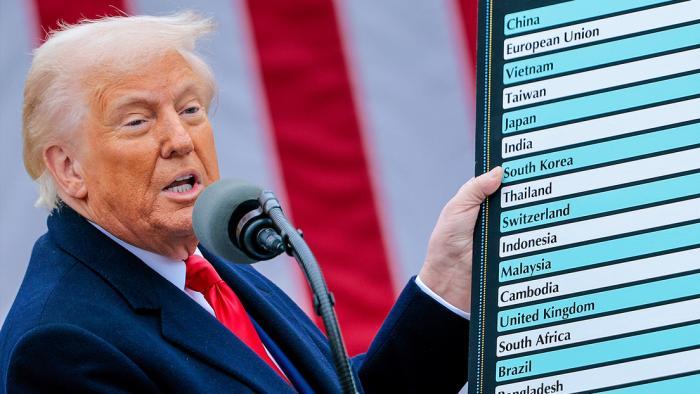
In the short term, no country could avoid the adverse impacts of the tariff offensive unleashed by the United States Government; but neither will the northern power escape the boomerang effect of its own lawlessness.
Last Thursday, President Donald Trump approved new customs duties, under the pretext of "further addressing the growing annual trade deficit of U.S. goods," and protecting the country "from foreign threats to national security and the economy."
In the opinion of analysts, the tycoon got a good part of the electoral support for his promises of economic reactivation, but instead of telling citizens that "they suffered for four and a half decades from neoliberal policies, he told them that they suffered because of China, trade and immigrants."
This was argued by Dr. Radhika Desai in a dialogue with the American academic Michael Hudson, whose printed title drew attention to "The Magician Mirage..." (An acronym for the slogan Make America Great Again, which identifies Trump and his supporters.)
With the whole issue of tariffs, in reality the president "intends to give the impression that he is addressing the problems of U.S. economy," said the expert, who directs the Geopolitical Economics Research Group of the University of Manitoba, Winnipeg, Canada.
In Hudson's words, "there is a far-fetched, almost schizophrenic theory behind Trump's policies." Hypothetically, the effect of tariffs would be to reduce exports and move production to the country's territory, "but the United States is deindustrialized."
In its media discourse, the White House spreads the belief that a lower exchange rate will increase the competitiveness of exports and generate hiring and investment.
But the U.S. is no longer an exporter or an industrial investor on a par with previous decades. "Therefore, the effect of a lower dollar will simply raise the price of imports even above the tariff. And the combination of high tariffs and a lower exchange rate will create an umbrella for American companies to raise their own price levels, as they are currently doing. "
The Crisis Observatory, a digital space dedicated to international affairs, also addressed the issue in an article by Hudson on "the new face of U.S. hegemonic crisis."
According to the analysis, Trump's bet, far from strengthening the manufacturing base, will accelerate the relative decline of the northern power, by isolating it from the most dynamic supply chains and forcing the global majority to try alternative mechanisms for its commercial and financial transactions.
The U.S. is trying to play virtually the same role as in 1944, when it succeeded in shaping the International Monetary Fund and the World Bank.
"The method changes its label, but the logic is clear: trade policy remains the American power card to dictate the rules of the global game," Hudson synthesized, alluding to the Bretton Woods agreements, fruits of the monetary and financial conference of the United Nations, held in July 1944.
For the economist, the novelty lies in the breadth of the geopolitical objective, since Trump does not hide that the tariff is a weapon to force others to join the New Cold War against China and Russia.
The national security clause, he argued, "can mean anything," and functions as a wild card to veto strategic goods. In practice, he said, Washington offers a dichotomy: align with its declining orbit or risk access to its market.
Under conditions of low global economic growth and high indebtedness, rising tariffs "could erode confidence, curb investment and threaten development progress, especially in the most vulnerable economies," warned the UN Trade and Development agency (the former UNTAD).
However, the U.S. remains committed to the use of force to try to preserve its former hegemony, in a scenario of global crises and inevitable multipolar reconfiguration.








